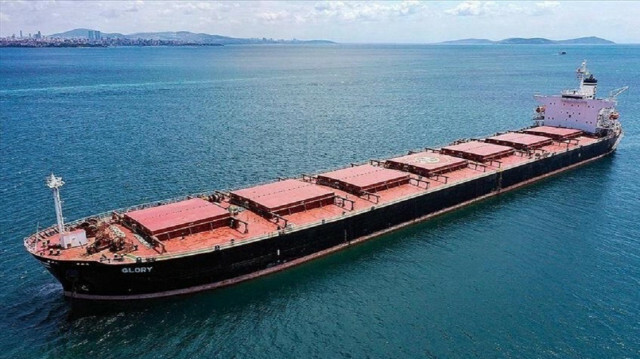
As of Friday, 668 vessels carried over 18 million tons of food from the ports of Odesa, Chornomorsk and Yuzhny, in which wheat was just over 27%, the Russian ministry noted
Recent data by the UN's executive body "distorts the facts" on the Black Sea grain initiative, Russia argued on Saturday.
In a statement, the Russian Foreign Ministry said a recent bulletin by the UN Secretariat laid "special emphasis" on wheat exports under the initiative by saying that an alleged 64% of it was sent to developing economies.
Last July, Türkiye, the UN, Russia and Ukraine signed an agreement in Istanbul to resume grain exports from three Ukrainian Black Sea ports which were paused after the Russia-Ukraine war began in February 2022.
As of Friday, 668 vessels carried over 18 million tons of food from the ports of Odesa, Chornomorsk and Yuzhny, in which wheat was just over 27%, the Russian ministry noted.
It said that only 551,527 tons, or about 3% of the total, was sent to "needy countries" – Ethiopia, Somalia, Yemen, Sudan, Afghanistan and Djibouti – and 2.9 million tons, or 16%, to countries of below-average income, like Bangladesh, India, Indonesia, Pakistan.
At the same time, countries of high- and above-average incomes, including the EU and UK, received 74% of all shipments, it said.
"We cannot confirm the information from the UN press release about more than 100 ships involved in the initiative and staying in Türkiye's territorial waters and about the average waiting time of 21 days. At present, there are 64 vessels in Ukrainian ports and inspection zones," the ministry said.
It added that the vessels were inspected and allowed to proceed based on lists prepared by Ukrainian representatives and that Russia had "nothing to do with."
The statement suggested that the UN could be alluding to a problem of "artificial accumulation of bulk carriers in the port of Istanbul," created by Ukrainian commercial companies that were chartering vessels "in violation of the agreed-upon rules and times for the registration and participation in the initiative."
"These vessels cannot be considered participants in the initiative until they are officially included. The Joint Coordination Centre in Istanbul bears no responsibility for them," it stressed.
Turning to the export of Russian fertilizers, including via the Togliatt-Odesa ammonia line, which was to begin simultaneously with Ukrainian food shipments under the deal, the ministry said the UN Secretariat "vaguely mentions some discussions between some unnamed parties seeking to reach some agreement."
Denying that Russian representatives were involved in any such talks, it said: "The transshipment of ammonia was to begin as part of the efforts to carry out the Black Sea Initiative. No additional agreements regarding this issue are required. The technical capability to restore the ammonia line does exist. The companies in charge of its maintenance are also ready to resume work. The only thing that is lacking is the consent of Kyiv."
The current situation creates an impression that "talk about the threats of hunger and global food security is just a cover for servicing the commercial contracts of Ukrainians and the economic interests of the Western beneficiaries," accompanied by attempts to distort the real situation regarding acute needs of African, Asian and Latin American countries, it claimed.

